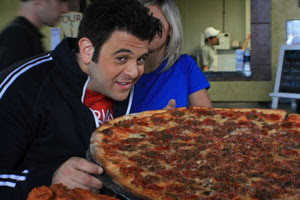GARY SHTEYNGART’S RECENT notoriety as America’s blurb-king (Including a documentary, a Tumblr and stories in the Washington Post) got some nostalgic gears turning.
 I was once lucky enough to have Gary pen some kind, funny words about my last novel. It was shockingly easy. He didn’t owe me money or anything. I simply sent him a Facebook message and he agreed. As Shteyngart has said in interviews, he just likes helping authors.
I was once lucky enough to have Gary pen some kind, funny words about my last novel. It was shockingly easy. He didn’t owe me money or anything. I simply sent him a Facebook message and he agreed. As Shteyngart has said in interviews, he just likes helping authors.
This blurb came as such a breeze I nearly forgot some of the more difficult quests I’d gone on in the name of praise. I was thinking, specifically, of the time I had to stalk the guy from Man vs. Food.
To get there, we should start at the start. Back before I knew what they were called.
“You know, those quotey things on the front of books,” I described them years ago.
Later, I learned they were called blurbs.
I lived and died by those blurbs before Amazon and Goodreads. They helped me play detective and discover new writers.
Reading that a well-known writer was calling another author a “revolutionary new voice” somehow legitimized whatever tome the words were found on.
So, when preparing my second novel for release, I eagerly wanted such kudos. I imagined a kid picking up my book and seeing a New York Times bestseller call me, “The future of American literature,” or “a dazzling wit,” or at least, “not horrible in bed.”
It’s surprising, but for as many big-time quotey things floating around the world’s books, most aren’t a Facebook message away. Even for the sexually above average. Slapping that praise on a book cover usually happens in one of three ways:
1: Aim high. Look up a favorite author or her agent and send an email (Or, obviously, a Facebook message) asking to ship off an Advanced Reader’s Copy (Essentially a crappy, unedited version of your book, known as an ARC) for a possible blurb.
Most famous authors are crazy busy and get enough ARCs to build their kids a fortress. So, inevitably, months pass and you realize this bestseller has ignored you. Your feelings are hurt for approximately three days.
2: Ask your writer friends. Start with the most popular ones you sort-of-know and work your way down. If you are lucky they will likely read part of the book and light some blurbic fireworks in your honor. I have been very fortunate with this approach, though all of my friends’ blurbs ignore my prowess between the sheets.
[NOTE: There’s a middle step where already famous writers ask their already famous friends. Jonathan Franzen probably gets his blurbs by simply asking Thomas Pynchon and Maya Angelou at Thursday night scrapbooking club.]
3: Dodge flying French toast while learning how fake TV really is and fall ass backward into a potential blurb.
See, the novel in question involves, among other things, freeze-dried hamburgers, deep fried hamburgers and a burger more addictive than meth. So, in addition to hounding my literary heroes like Shteyngart, I also sent ARCs to twisted foodie guys like Anthony Bourdain, Morgan Spurlock and Alton Brown. The white whale on this gastronomic blurb hunt was gonzo chowdown king Adam Richman of Man Vs. Food fame.
Unlike the others, the jovial Richman was so difficult to track down I stopped believing he was real. The guy was probably just a CGI image. It made sense. How could someone wolf down a ten-pound pizza without Pixar’s help?
Try finding Richman online, I dare you. The guy has a thinner paper trail than most illegal aliens. Nowhere on the internet could I find an email address or physical address for the phantom Richman. Not an agent. Not a manager. Not even a cardiologist begging him to stop.
So, imagine my surprise when I located Adam Richman around the corner from my house in Louisville, KY—catapulting French toast through the air.
This neighborhood restaurant, Lynn’s Paradise Café, is always on those travel-centric food shows because of its wacky décor, hour-long breakfast waits and $45 omelets. One Wednesday afternoon a few springs ago I walked past its parking lot and saw a small crowd and a camera crew.
“Man Vs. Food is going to be shooting,” one onlooker told me. “Adam Richman’s here!”
“That CGI guy?” I said.
She squinted at me.
What luck! I quickly embedded myself into the crowd and waited to ask America’s favorite overeater to pen a few sentences about my brilliance. Perhaps he’s heard about my could-be-worseness in bed? Toss that in, too, please.
Boy, was I glad I took that walk.
The crew had rigged some enormous wood and rubber band catapult system. The idea was to launch a slice of batter-dipped toast across the parking lot onto a hot griddle. After an hour in the burning Kentucky sun, a round man in shades and a grey shirt exited a trailer. I watched closely for that telltale digital flicker of holograms, but no, Richman was real!
Real boring, too.
I never knew TV took so long to shoot and reshoot and reshoot and reshoot. For every ten seconds the elusive Adam spends onscreen, it’s safe to say five minutes go into repeating the shot. It also looks like a hell of a lot more work than I figured.
Eventually, after failing to hit the griddle target, the crew simply faked the Apollo 11 of French toast and urged the crowd to pretend to go wild. Ahhh, TV magic.

The crew’s lunch break arrived and I was as pink and sweaty as Richman after conquering a nuclear hot wing contest. Adam walked by and I asked if he had a second. Behind sunglasses, he stared at me, like: “Oh, boy, another question about that ten pound pizza.”
I told him my novel was about hamburgers more addictive than meth. I thought he’d find it funny. Could I send it to him for a possible blurb?
He looked at me like he wished I’d asked about pizza instead. “That’s cool. I just wrote a book,” he managed, vaguely distracted.
“Totally. I know!” I blurted before my mind could inform me that, no, I wasn’t aware he’d written a book.
“Sure, yeah, send it to our production company,” he said. “That’s the one way I’ll definitely see it.”
An assistant gave me the address and I quickly mailed off an ARC with a very nice note.
Later, I discovered Richman isn’t completely devoid of a paper trail. He’s a prolific Tweeter, so I followed up a few weeks later on Twitter.
This was two years ago. The book already came out in March 2012.
I’m still waiting to hear back.
All this silence wouldn’t be a problem if only I’d been accepted into that damn scrapbooking club. Jonathan Franzen’s exclamation point-filled blurb about my iffy-at-best sexiness was this close.
Thankfully, Gary Shteyngart wasn’t too busy launching breakfast across parking lots to pen a quotey thing for me. Let’s hope he can keep it up for future generations of writers.


